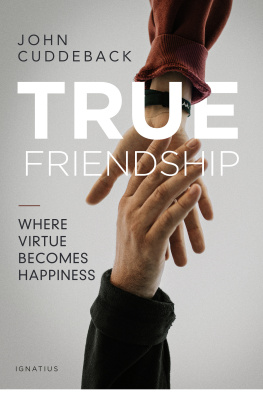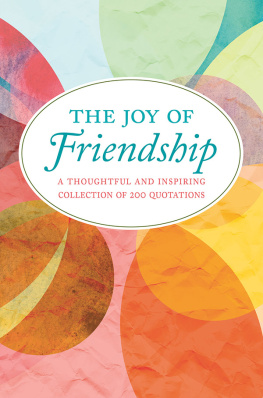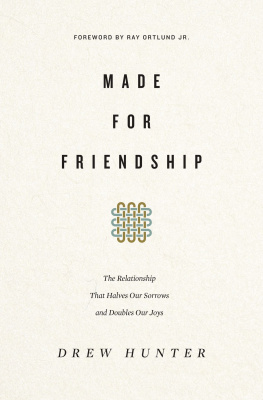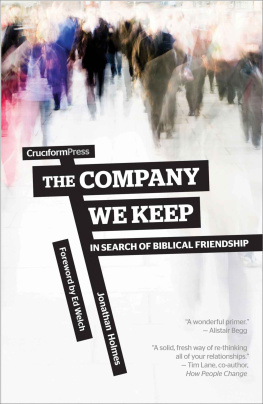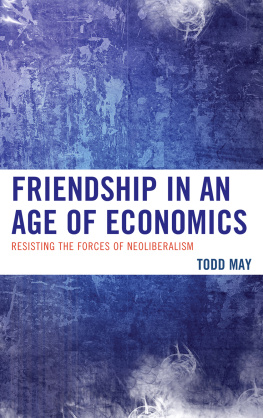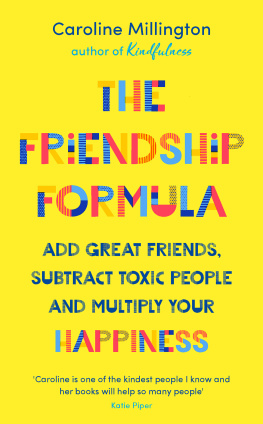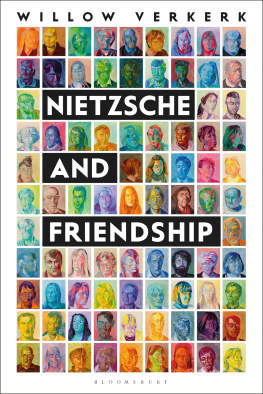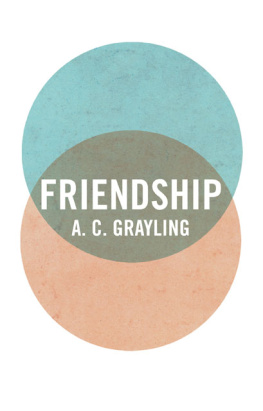TRUE FRIENDSHIP
John Cuddeback
TRUE FRIENDSHIP
Where Virtue
Becomes Happiness
IGNATIUS PRESS SAN FRANCISCO
Scripture citations used in this work are taken from the Revised Standard Version of the BibleSecond Catholic Edition (Ignatius Edition), copyright 1965, 1966, 2006 National Council of the Churches of Christ in the United States of America. Used by permission. All rights reserved.
Excerpts from the English translation of the Catechism of the Catholic Church for use in the United States of America copyright 1994, United States Catholic Conference, Inc.Libreria Editrice Vaticana. English translation of the Catechism of the Catholic Church: Modifications from the Editio Typica copyright 1997, United States Conference of Catholic BishopsLibreria Editrice Vaticana.
Cover photograph by Austin Kehmeier/Unsplash
Cover design by Enrique J. Aguilar
2021 by Ignatius Press, San Francisco
All rights reserved
ISBN 978-1-62164-355-5 (PB)
ISBN 978-1-64229-149-0 (eBook)
Library of Congress Control Number 2020946173
Printed in the United States of America
Foreword
Searching history, both secular and sacred, one is hard-pressed to find examples of authentic friendship. There are certainly great people and great achievements, but what about great friendships? Yes, we see the loyalty of Jonathan, who, despite the fact that he is the heir apparent to the throne of Israel, prefers faithfulness to David over personal power (1 Sam 1820). It is inspiring to see Elishas fidelity to Elijahunwilling to leave his mentors side until the latter is carried away to heaven in a chariot of fire (2 Kings 2). But in history, betrayal seems more typical than genuine friendship: Jesus is betrayed by one of his apostles, Brutus betrays his Caesar, and even in legend, Lancelot betrays King Arthur.
We should not be astonished that something so important to each of us is also so difficult to achieve. Original Sin did not merely force the human family to relocate; it sent a devastating rift into our relationshipswith God and with one another. Only moments after the Fall, man and woman were at odds with each other, and within a generation, their children were killing one another. Ever since, it seems, this world has offered more heartache than consolation when it comes to relationships.
So where can we turn to find authentic friendship? Ancients, such as Plato and Aristotle, tell us about friendship. Jesus gives us the power to live it. The proof is right there in history. If we peel back our sometimes overly pious perceptions of the saints, we will see something amazingthey almost always come in clusters. It is not by accident that when we think of Saint Augustine, we think of Monica and Ambrose; when we think of Saint Francis, we think of Clare and Brother Bernard; and when we think of Saint Ignatius of Loyola, we think of Francis Xavier. These Christians lived in the power of Christ and realized the joy of the restored ability to live in friendship with God and with one another. This ability can be yours as well, if you learn how to forge friendship.
Of all that we desire in life, friendship has a unique place. Indeed, can there even be happiness without friendship? What if you had all that the world could offersuch as health, wealth, and reputationbut no one to share it with? Every evening you were graced with a perfect sunset, but you could never say to a friend, Look, isnt it beautiful? Friendship is the crowning gift of happiness. But it does not stop there. Friendship proves itself in suffering: A friend loves at all times, and a brother is born for adversity (Prov 17:17). Even when wealth disappears, or health departs, a friend can soften the pain. And what can compare to the sting of being betrayed by a close friend? Friendship is not merely part of a good lifeit is at the heart of what it means to live life to the full.
Our hearts tell us that we are made for friendship, and there is a reality that corresponds to our desire, but how do we realize it? John Cuddeback has given us a great tool: True Friendship. Authentic friendship does not just happenit is an art that must be learned, a skill that must be practiced. True Friendship shows us the wisdom of the ancients, what the most admirable women and men of the past have learned about forging friendships that will endure.
But there is more. We need more than a roadmap; we need assistance in following the path. At times, something within us hinders us from doing even what we know is right. If we look honestly at ourselves, we find a gap between what we are and what we know we ought to be. Bridging this gap is a necessary precondition to finding genuine friendship. This is precisely the genius of this book; providing more than answers, it points us toward the antidote.
We find ourselves hungering for friendship not only with a brother or a sister, but, in a deeper place, with God. You have made us for yourself, and our hearts are restless until they rest in you, says Saint Augustine in his Confessions. The actions of Christ anticipate the hunger in our hearts. Jesus comes to us with an offer of friendship: No longer do I call you servants... but I have called you friends (Jn 15:15). His gracious initiative starts us on the path to friendship; he is the creative artist of our hearts, and with his presence in our lives, we begin to live the art of friendship. Where we are blind, he brings light; where we are broken, he brings healing; and where we are alone, he comes to us. I have loved you with an everlasting love (Jer 31:3).
It is within the friendship of Christ that we may begin to form friendships with others. Saint Paul rejoices in this radical freedom to live friendship when he reminds the Christians at Thessalonica, Being affectionately desirous of you, we were ready to share with you not only the gospel of God but also our own selves, because you had become very dear to us. (1 Thess 2:8). This is the freedom we have in Christto live life to the full. Yes, in this world we will find trials and tribulations, but we need not be alone. Friendship magnifies our joy and can bear us through lifes difficulties. Can there be anything more important than learning how to become a true friend?
Curtis Martin
Preface to the Second Edition
Early in the new millennium, a relatively new campus ministry organization (FOCUS) asked me to write a book on friendship. The first few years of their work with young people in college had made clear a serious problem: a lack of understanding of friendshipits nature, its kinds, its importance. Many young people knew they were missing something, but they did not know what, or how to get it. They felt disconnected and lost.
I had already been teaching Aristotle and Saint Thomas Aquinas on friendship to my college students for a few years, and I had seen in that short time that the truth about friendship changes lives. So I wrote the first edition of this book.
If life has taught me something in the intervening decade and a half, it might be this: to know something about true friendship is one thing, and to live it is another. Life tends to humble us. At the same time, it teaches us that the truths of reality are even better than we realize, if we have eyes to see it. My conviction that the truth about friendship is simply life changing has only gotten deeper.
In the intervening years, I have also begun to appreciate a lesser-known aspect of Aristotles and Saint Thomas thoughts on friendshipnamely, how there can be friendship between parents and children and between teachers and students. This too has changed my life, even as the concrete circumstances of my life have changed. I am very happy to add a chapter on this important topic.
Next page
